Filter by

Martin Waldseemüller’s 'Carta marina' of 1516 : Study and Transcription of…
This open access book presents the first detailed study of one of the most important masterpieces of Renaissance cartography, Martin Waldseemüller’s Carta marina of 1516. By transcribing, translating into English, and detailing the sources of all of the descriptive texts on the map, as well as the sources of many of the images, the book makes the map available to scholars in a wholly unprece…
- Edition
- 1
- ISBN/ISSN
- 9783030227036
- Collation
- VII, 150 hlm,: ill, lamp;
- Series Title
- -
- Call Number
- -

Spationomy : Spatial Exploration of Economic Data and Methods of Interdiscipl…
This open access book is based on "Spationomy – Spatial Exploration of Economic Data", an interdisciplinary and international project in the frame of ERASMUS+ funded by the European Union. The project aims to exchange interdisciplinary knowledge in the fields of economics and geomatics. For the newly introduced courses, interdisciplinary learning materials have been developed by a team of…
- Edition
- 1
- ISBN/ISSN
- 9783030266264
- Collation
- VIII, 325 hlm; ill., lamp.,
- Series Title
- -
- Call Number
- -

Maritime Spatial Planning: past, present, future
This open access book is the first comprehensive overview of maritime or marine spatial planning. Countries across the globe are beginning to implement maritime spatial plans; however the authors of this collection have identified several key questions that are emerging from this growing body of MSP experience. How can maritime spatial planning deal with a complex and dynamic environment such a…
- Edition
- 1
- ISBN/ISSN
- 9783319986968
- Collation
- XXXVII, 477 hlm; ill., lamp.,
- Series Title
- -
- Call Number
- -

Spatial Similarity Relations in Multi-scale Map Spaces
How does one determine how similar two maps are? This book aims at the theory of spatial similarity relations and its application in automated map generalization, including the definitions, classification and features of spatial similarity relations. Included also are calculation models of spatial similarity relations between arbitrary individual objects and between arbitrary object groups, and…
- Edition
- -
- ISBN/ISSN
- 978-3-319-09743-5
- Collation
- -
- Series Title
- -
- Call Number
- -
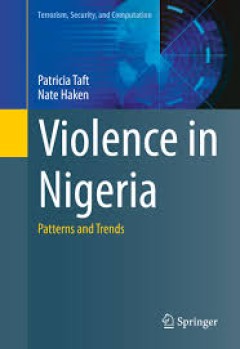
Violence in Nigeria Patterns and Trends
This book takes a quantitative look at ICT-generated event data to highlight current trends and issues in Nigeria at the local, state and national levels. Without emphasizing a specific policy or agenda, it provides context and perspective on the relative spatial-temporal distribution of conflict factors in Nigeria. The analysis of violence at state and local levels reveals a fractal pattern of…
- Edition
- -
- ISBN/ISSN
- 978-3-319-14935-6
- Collation
- -
- Series Title
- -
- Call Number
- -
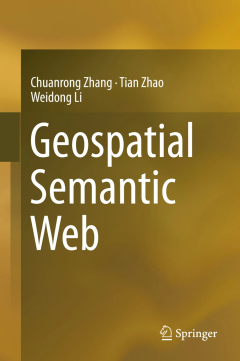
Geospatial Semantic Web
This book covers key issues related to Geospatial Semantic Web, including geospatial web services for spatial data interoperability; geospatial ontology for semantic interoperability; ontology creation, sharing, and integration; querying knowledge and information from heterogeneous data source; interfaces for Geospatial Semantic Web, VGI (Volunteered Geographic Information) and Geospatial Seman…
- Edition
- 1
- ISBN/ISSN
- 978-3-319-17800-4
- Collation
- VII, 194
- Series Title
- -
- Call Number
- 401.43 ZHA g
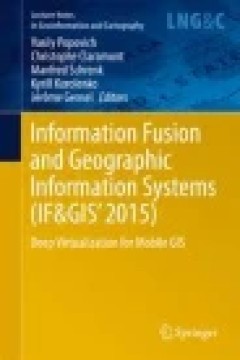
Information Fusion and Geographic Information Systems (IF&GIS' 2015) Deep Vi…
These Workshop Proceedings reflect problems concerning advanced geo-information science with a special emphasis on deep virtualization for mobile GIS. They present papers from leading scientists engaged in research on environmental issues from a modeling, analysis, information processing and visualization perspective, as well as practitioners involved in GIS and GIS applications development. Th…
- Edition
- -
- ISBN/ISSN
- 978-3-319-16666-7
- Collation
- VIII, 172
- Series Title
- -
- Call Number
- 910 INF

Health, Science, and Place: A New Model
Amy Blatt, Ph.D., GISP, has over 15 years of research and teaching experience in geography, GIS, and public health, gained at the University of Cincinnati, West Chester University of Pennsylvania, and other institutions. She operates as a consultant on advanced geospatial applications and visualizations, and her health research has been favorably reviewed in Nature. As a special theme co-editor…
- Edition
- 1
- ISBN/ISSN
- 978-3-319-12002-7
- Collation
- XI, 133
- Series Title
- -
- Call Number
- 910 BLA h
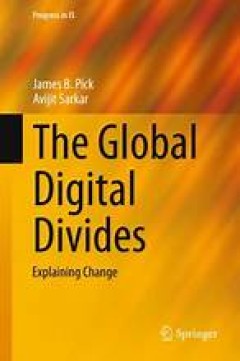
The Global Digital Divides
This book analyzes extensive data on the world’s rapidly changing and growing access to, use and geographies of information and communications technologies. It studies not only the spatial differences in technology usage worldwide, but also examines digital differences in the major world nations of China, India, the United States and Japan at the state and provincial levels. At the global lev…
- Edition
- 1
- ISBN/ISSN
- 978-3-662-46602-5
- Collation
- XXIX, 386, 79 b/w illustrations, 44 illustrations in colour
- Series Title
- Progress in IS
- Call Number
- -
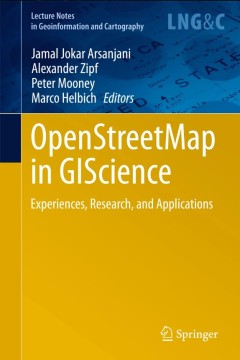
OpenStreetMap in GIScience:Experiences, Research, and Applications
This edited volume presents a collection of lessons learned with, and research conducted on, OpenStreetMap, the goal being to promote the project’s integration. The respective chapters address a) state-of-the-art and cutting-edge approaches to data quality analysis in OpenStreetMap, b) investigations on understanding OpenStreetMap contributors and the nature of their contributions, c) identif…
- Edition
- 1
- ISBN/ISSN
- 978-3-319-14279-1
- Collation
- XI, 324
- Series Title
- Lecture Notes in Geoinformation and Cartography
- Call Number
- -
 Computer Science, Information & General Works
Computer Science, Information & General Works  Philosophy & Psychology
Philosophy & Psychology  Religion
Religion  Social Sciences
Social Sciences  Language
Language  Pure Science
Pure Science  Applied Sciences
Applied Sciences  Art & Recreation
Art & Recreation  Literature
Literature  History & Geography
History & Geography